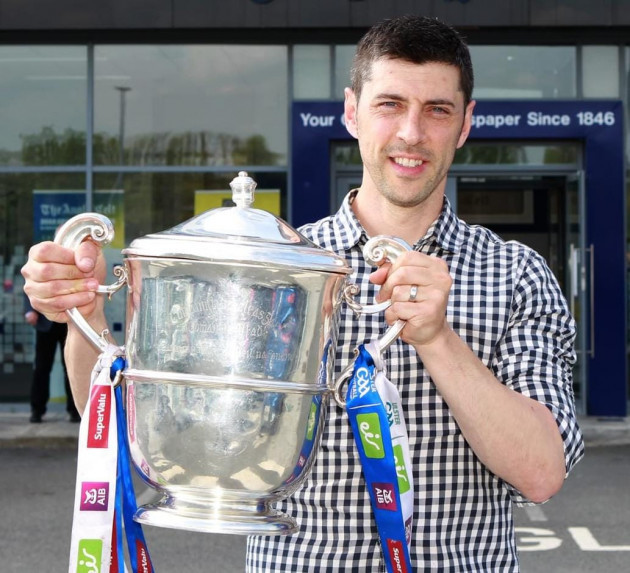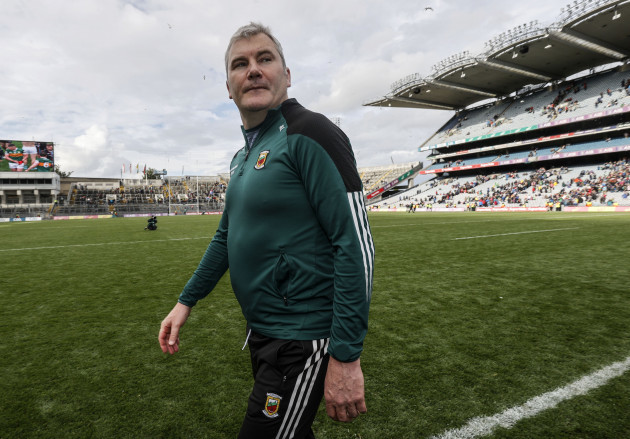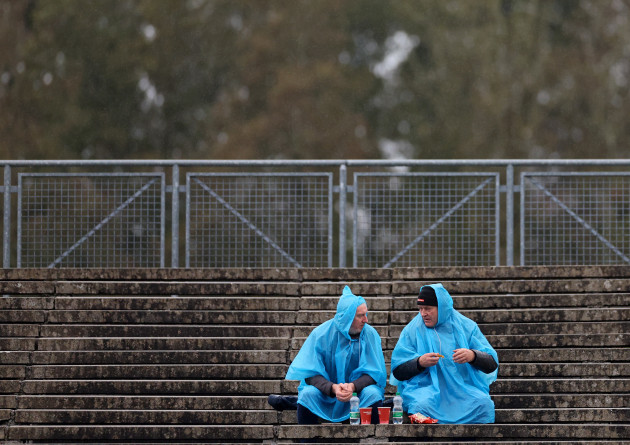I
Damien Donohue was walking from Kingspan Breffni Park when a man unknown to him caught his attention. “You’ve changed my relationship with my brother,” this stranger told him, giving Donohue cause to wonder if he should hear the man out or start running.
“He used to ring me to find out how the game went,” it was explained, “but now I’ll guarantee you that within the next 5 minutes he’ll ring me on the phone and tell me how the game went.”
The man’s brother was Frankie Dolan, a former Cavan footballer, and he had started listening online to Damien’s commentary of club games from his home in San Francisco.
It hadn’t been lost on Damien that there was an international audience for his broadcasts on Northern Sound, even if there was something special about a former county player eight hours removed waking up to hear him call a match. Club games in Cavan only available to those listeners willing to search them out online, he knew their occurrence could stir an interest that was felt far beyond the county.
He had seen it himself on a 2015 trip to New York when the county’s senior footballers travelled over for a pre-season game against their American hosts. In a bar owned by another Cavan ex-pat, Connie O’Reilly, Damien listened as O’Reilly explained how the GAA enabled emigrants like him to maintain a connection to home.
“At that time, Cavan County Council had a slogan going, ‘This is Cavan’,” recalls Donohue, “and Connie said how he loved this slogan, ‘but Cavan’s not just a place. We are Cavan’.” Having toyed around with a couple of other local journalists about the idea of a podcast dedicated to Cavan GAA, O’Reilly’s words provided the spark.
“I thought, bang, that’s us,” he explains. “I went to the boys and told them we had our name.” The We Are Cavan podcast was born.
II
There is a close association between the GAA and talking.
What other sporting organisation would endeavour to create The GAA Oral History Project; a staggering collection of 790 interviews with GAA fans, players and administrators commissioned in 2009 and available to listen to in their entirety online.
One of the GAA’s great follies – the inadequacy of its record-keeping in terms of games played and statistics – inadvertently encourages people to keep half-known stories alive through story-telling. The best GAA books on offer only serve to remind that they’re have been far too few written for all that has happened.
Unsurprisingly, this grounding in an oral tradition primed the GAA community for the arrival of the podcast.
Damien Donohue, alongside fellow GAA journalists Paul Fitzpatrick and Mickey Brennan, were early adopters of the new form with We Are Cavan. All manner of tastes are being catered to now, however.
With major outlets carrying one or more GAA podcasts dedicated to Gaelic football and hurling on a national scale, just beneath the surface there are those primarily interested with the goings-on of one county: We Are Meath (and off-shoot of their Cavan forebearer), The Premier ‘View’ Tipperary GAA Podcast, The Kerry Football Podcast, The Maroon And White Pod, The Kilkenny Hurling Podcast, The Little All-Ireland podcast in Cork, and so on.
Each goes about their business in different ways, but there is a commonality in their shared focus on both the county and club games. These are local podcasts for people interested in the locality.
As with We Are Cavan, it is not unusual for local GAA journalists to springboard these podcasts as a means of harnessing the information they have already acquired covering Gaelic Games for a local newspaper or radio station.
And yet, there are those for whom the podcast has become a means through which they can continue the chats they’ve already been having for an audience of like-minded enthusiasts.
III
Enda McGearty: “I’m sick to death listening to this shite about ‘Horan-ball’ – ‘Horan-ball’ isn’t winning ball unfortunately, Ref. Running your half-backs in on top of your forwards, having Tommy Conroy up front with pace to burn and we can’t get the ball into him… he makes the run and the ball doesn’t come.”
Ref: “When we did kick it in it was effective.”
Enda: “Yeah, but we don’t kick it. Since [James] Horan is there we play a running game, a chaos game out of the half, try and turn them over [and] hit them on the break. We don’t kick the ball, we run the ball – over and back.
Ref: “Yeah, if we don’t get into the scoring zone on the first attack crossing the 45-yard line, we’re fucked.”
Enda: “… ‘Horan-ball’ is a failure. It’s not going to win an All-Ireland.”
-
Ah Ref podcast, September 16, 2021
IV
The Ah Ref Mayo GAA podcast started out as a mobile phone recording in a car.
Known to those who wish to seek him out, the eponymous ‘Ref’ is a Mayo supporter who opted from the outset to keep his identity hidden. It wasn’t that he had any intention of saying outrageous things that might encourage people to seek retribution, rather, he cannily decided that some mystique couldn’t hurt his attempt to get the podcast noticed.
Alongside fellow Mayo supporter Enda McGearty and a range of regular and irregular contributors, they have cultivated an audience of thousands who listen weekly to what they have to say about Mayo football and the characters who inhabit it.
“People like that local touch,” says ‘Ref’. “We might know that a certain pitch has bad parking or there’s a way to get in there for free. It’s true, like, you can get into Breaffy through the trees. If you want to . . . ”
Their local knowledge of the GAA scene in Mayo is without reproach, and ‘Ref’ himself remains involved with Gaelic football in a coaching capacity. They are not pub-talkers, even if their stated desire is to recreate the kind of conversation you’d find yourself having in the pub.
To this end, ‘Ref’ reminds The 42 on a few occasions that they are not journalists. They get things wrong, they let their passion for what they’re talking about spill over and they will occasionally end up falling out over some aspect of a game they disagree about.
“Everything might go quiet for a day or two,” he says with a laugh, “but then we’ll go back at it again.”
First and foremost, they are supporters. And being Mayo supporters, no less, they appreciate and have found favour in a common sense approach to the highs and lows of Mayo football.
“Our biggest hits are when Mayo lose a big game,” he explains, the 2021 All-Ireland final defeat to Tyrone sparking an episode that remains worth listening back to even now three years removed.
“And if it’s a good win against Galway or Roscommon, people want to hear what we’ve to say about Mayo being back and all the shite that goes with it. We know we’re not the best team in the country, but if we’ve a chance to go mad for a weekend and tell everyone, ‘We’re back!’, why not like?
“This is football, it’s for a bit of fun. If there’s craic to be had sure it takes your mind off the real problems in the world for a while.”
IV
Be they fan-led or headed by journalists, the relatively recent emergence of these local GAA podcasts hinges on a few different requirements.
The challenges faced by traditional sports departments in regional newspapers or radio stations means that whatever chance club GAA games, particularly, had of being adequately covered has diminished. This at a time when the increased presence of sports coverage available generally has inevitably led people wanting more from their GAA coverage too.
People have always been able to glean information about the local goings on from within their own community through word of mouth, yet there’s a greater expectation of what constitutes coverage now.
It sounds almost insulting to previous generations to suggest that GAA supporters are now more critically aware or educated about modern football or hurling, but the sheer breadth of national coverage for Gaelic Games has made the bare minimum less palatable. This is particularly borne out in the frustration surrounding The Sunday Game and its ongoing efforts to offer some measure of coverage to every county game on a particularly busy weekend.
“It’s almost like the half-time whistle or full-time whistle has blown and they’ve taken their notes and typed them into Chat GPT to come up with two minutes of analysis for the game,” suggests ‘Ref’. “They’ll mention a few stats and the obvious bits, and that’s it.”
Consider then the simple fact that advances in technology have enabled people to create and share podcasts at a relatively low cost, and it stands to reason that opinions once shared on social media, in online message boards or in chats amongst friends are now being transmitted in such an effective way.
“We’re all media users now,” explains Dr. Neil O’Boyle to The 42, a lecturer in Dublin City University’s School of Communications, “content creators with a small ‘c’, we’re all participating on some level.”
In a New Yorker article concerning the exponential growth of quality podcasts for followers of the NFL, Adam Gopnik touched on another facet of the medium’s appeal that correlates (for this sports fan, at least) with what is happening in the world of GAA.
“We increasingly seem to like hearing about the games more than watching them,” he reasoned, although the NFL’s viewing figures would generally suggest that people aren’t turning off in their droves just yet.
On a recent episode of The Bill Simmons Podcast, the American journalist Derek Thompson mirrored Gopnik’s opinion from an NBA supporter’s point of view: “I probably listen to hundreds of hours of NBA podcasts every year, but do you know how much basketball I watch before May (the tail end of the NBA playoffs), probably 20 minutes . . . It’s kind of like the NBA is a piece of audio gossip for me, like a reality show that lives in my ears for 6 months and transforms into a live sport every Spring.”
V
For both We Are Cavan and the Ah Ref podcast, club games that have never really been totally accessible to people (for the fact you can only be in one place at a time, if nothing else) provide a significant source of interest for their listeners.
“Our peak every single year is club,” says Donohue. “You could watch the graph and it constantly rises [when the club season begins]. Every single year.”
There is a clear appeal here for those participating in the club game to hear how potential opponents are going, and if your own club has gone particularly well to take some pleasure in the praise that follows.
Yet, as Damien Donohue has come to realise, these discussions serve as a source of great intrigue for people who may only attend a handful of games every year. The Ah Ref podcast is similarly attuned
“There’s 50 or so clubs in Mayo and between ourselves we’d all have a fair scope of what’s going on in every one of them,” explains ‘Ref’, “but then every club has a local header and we’ll bring him up too!”
Additionally, these podcasts provide a lifeline to many people living far from home. Citing one listener in Australia who saves the podcast for his hour-long commute to and from work, Donohue is gratified by service it provides.
“When this guy would come home to Cavan,” he says, “he’d be in the Lavey Inn and could go up to Ger Smith and tell him he was listening to the podcast and heard he’d scored a great goal against whoever.
“It’s a conversation-starter, instead of being the guy who’s gone away and has no idea of what’s going on at home.”
‘Ref’ is more prosaic about such knock-on effects: “They get a slice of home for an hour every week, just people talking shite.”
The desire or lack thereof to engage with the watching of these games is often determined by circumstances of fate or whereabouts. But the increasing ease with which listeners can become involved in the conversation strikes at that fundamental link between the GAA, our communities and talking.
For the first time this year the Ah Ref podcast was considered serious enough by the Mayo County Board to warrant accreditation to the launch of the senior county football team’s season. It was something ‘Ref’ had courted and he was pleased to be acknowledged on a par with the gathered journalists.
Yet, as with anything which springs from the community with no particular allegiance to the power brokers, it is not unforeseeable that county boards across the country will quickly cotton on to the fact that where there is an audience there is a narrative that can be influenced to cause the least possible hassle.
“They know that there’s a lot of people listening,” reasons ‘Ref’, “and they probably want to play ball with us as much as we want to play ball with them.
“I don’t want this to turn into a job [though], don’t want to be waking up thinking I have to do this because I’m depending on it for an income.”
To what degree we are at the beginning of a process that will perhaps become more official and less reliant upon the enthusiasm of sporadic podcasters remains uncertain.




